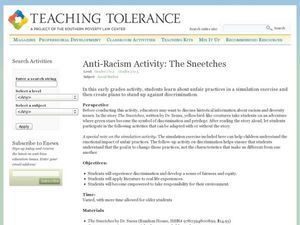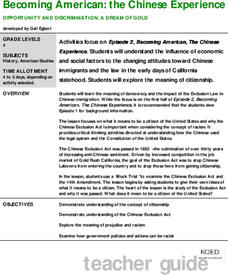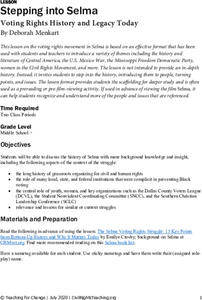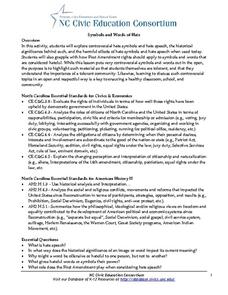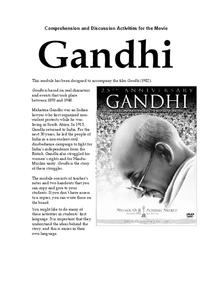Curated OER
Anti Racism Activity: The Sneetches
Young scholars group together into fairness teams and reflect on how to be fair. For this fairness lesson plan, students read about The Sneetches and discuss how racism singles people out. Then they discuss their own experiences and...
Curated OER
Opportunity and Discrimination, A Dream of Gold
Students focus on what it means to be a citizen of the United States and why the Chinese Exclusion Act is important when considering the concept of racism.
Curated OER
The Jim Crow Era
Students examine how African-Americans were affected by the Great Depression. In this African-American history lesson, students conduct independent research on the social conditions of the time period using the suggested resources....
CHPCS
The United States in the 1920s: The New Negro Movement and the Harlem Renaissance
Music, writing, and activism all tell the story of history! The resource uses these elements and more in a presentation to discuss the Jazz Age and Harlem Renaissance. Your class views biographies, discusses important events, and...
Facing History and Ourselves
Public Art as a Form of Participation
David Binnington's mural commemorating the 1936 Battle of Cable Street is the focus of a lesson that looks at public art as a form of civic participation. After reading background material about the mural, individuals analyze a segment...
Just Health Action
Whose Backyard? Toxic Waste Management Meeting and Environmental Injustice
Toxic waste is a global problem. What to do with environmental hazards and where to put toxic waste is a global concern. To better understand current issues around toxic waste management and how current practices can lead to...
Teaching for Change
Stepping into Selma
The 1964 Selma to Montgomery, Alabama voting rights marches are the focus of a instructional activity designed to introduce learners to people who took part in the Civil Rights Movement. Class members set into the role of one of the...
Teaching Tolerance
Racial Disparity in the Criminal Justice System
Explore the impact of the war on drugs in a thought-provoking lesson for high school academics. Young historians delve into the world of the criminal justice system and the racial disparity that occurs in the US. The resource provides...
Teaching Tolerance
Parallels Between Mass Incarceration and Jim Crow
Is history repeating itself? A riveting lesson examines the parallels between mass incarceration in the U.S. and the Jim Crow Laws of the past. Academics review Jim Crow Laws and compare them to mass incarcerations of African Americans....
PBS
Who Are Latinos?
What does it mean to be Latino? With an eye-opening lesson plan, pupils discover what it means to be Latino in the United States. They participate in classroom discussions, use graphic organizers, and watch a short video to help...
Teaching Tolerance
Why Do We (Still) Celebrate Columbus Day?
What are we really celebrating on Columbus Day? The resource explores the narrative behind Columbus Day and ways for people to change the perception. Scholars also review vocabulary terms associated with the topic and how attitudes have...
Facing History and Ourselves
Blending In and Standing Out
An excerpt from Sarfraz Manzoor's memoir about how his experiences as a Pakistani growing up in England shaped the way he though about his identify provides a stimulus for a discussion of how experiences can shape our concept of identity...
Facing History and Ourselves
Defining Our Obligations to Others
Introduce young learners to the concept of a Universe of Obligation, a term coined by sociologist Helen Fein, with a instructional activity that asks learners to consider the extent to which they feel a responsibility for others. Class...
Teaching for Change
Selma in Pictures: Socratic Seminar
Photographs from the freedom movement in Selma, Alabama serve as the basis of two Socratic Seminars. Class members prepare for the seminars by closely observing the images, form a hypothesis, and use evidence from photo to support a...
C-SPAN
Last Days of Martin Luther King, Jr.
On April 4, 1968, Dr. Martin Luther King, Jr. was assassinated in Memphis, Tennessee. Four video clips reveal the events of that time, including the shift in the focus of the Civil Rights Movement, the aftermath of the assassination, and...
University of North Carolina
Symbols and Words of Hate
This resource is structured with exercises that ask class members to explore hate symbols and hate speech. Learners examine the historical significance and harmful effects of these words and symbols, examine the First Amendment and...
North Carolina Consortium for Middle East Studies
Journey of Reconciliation, 1947
After examining the Jim Crow laws and reading primary source materials about the 1947 Journey of Reconciliation, class members create historical markers that honor riders and their journey.
Curated OER
Prejudice and Discrimination
How do we break the habit of prejudice? The activities in this packet are designed to promote awareness, harmony, and acceptance. Participants identify their stereotypic beliefs, attitudes, and behaviors, reflect to discover the sources...
Pacific University Oregon
Civil Rights: US History
To gain an understanding of the Civil Rights Movement of the 1960s, class members investigate the Jim Crow Laws, the Emancipation Proclamation, the 13th, 14th, and 15th Amendments of the US Constitution, and the 1898 Supreme Court case,...
Anti-Defamation League
10 Ideas for Teaching Black History Month
Celebrate Black History Month with the help of 10 ideas that delve deep into the history, major events, contributions, famous African Americans, and sheds light on how scholars today can take a proactive stance on current civil rights...
Student Achievement Partners
You've Been Lied To: The REAL Christopher Columbus
Looking for resources that explore alternative perspectives of the Christopher Columbus story? Check out the images, videos, cartoons, primary source documents, and other texts in a packet designed to spark...
Library of Virginia
Death or Liberty
What would you do to protect your own freedom? How far would you go to protest injustice? Class members are asked to consider these questions as they read primary source documents that detail events in the lives of Gabriel, Nat Turner,...
Curriculum Project
Gandhi
Introduce class members to Gandhi's non-violent, non-cooperative ideas with Richard Attenborough's 1982 bio-epic. The film traces the experiences that gave shape to Gandhi's ideas and the actions that eventually lead to the end of...
PBS
Racial Equality: How Far Have We Come and How Far Do We Have To Go?
Is everyone treated fairly in America? The culminating fifth lesson from a series of five has pupils explore racial inequalities from the 1960s and decide whether or not society has changed over time. The lesson comes with a speech from...


